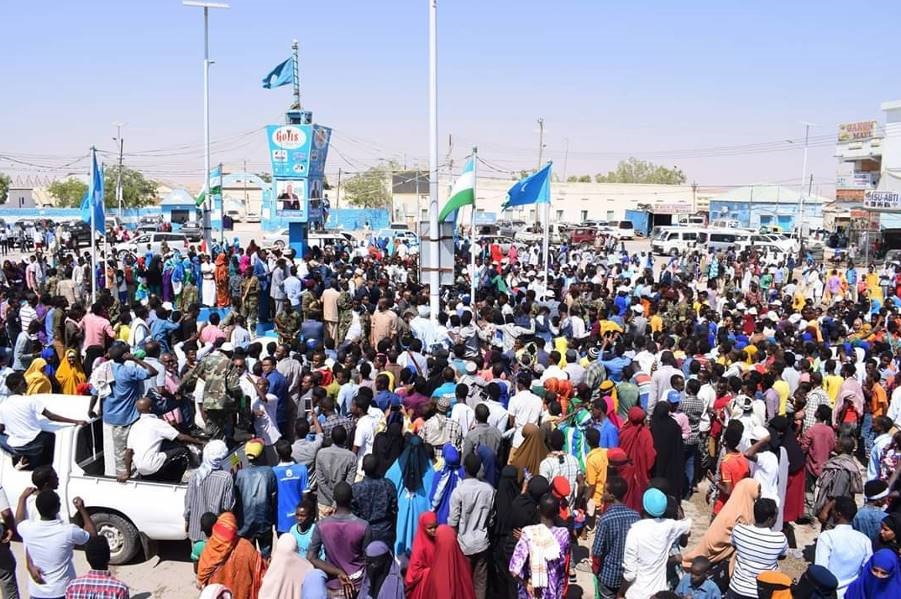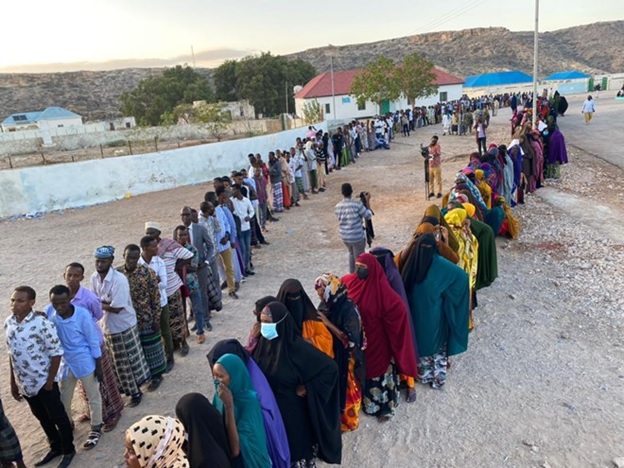By Syed Ahmed Gashan
“Every one of you is a shepherd, and is responsible for his flock; the leader of people is a guardian, and is responsible for his subjects…”Abdullah ibn Umar, source: Sahīh al Bukhāri:7138, Sahīh Muslim:1829.
Preamble
In the annals of history, this year has the hallmarks of circa. 2001, when the Puntland State faced its toughest challenge, one which could be argued planted its roots, albeit at a cost in blood and property [1]. Shortly post its inception, and through successive political leaders, attempts had been made to institute democratic system of governance in the form of state institutions, and direct elections of its political leaders at its three levels of government. District Council elections, for the first time, had been held in October, 2021, followed by State-wide District Council elections in May, 2023 [2] excluding three districts including the Capital, where elections are pending due to a dispute as to the election process, howbeit election results had been widely accepted, and with commendation to the State.

A challenge now facing the State entails as to how best hold Presidential and Parliamentary elections scheduled on February 25th, 2024, albeit was originally expected on January 8th, 2024 the end of term of the current administration, ergo causing the dispute with the opposition; January 8th is a generally accepted convention for the Presidential election [3], and whilst aforesaid date is more of a tradition, it is arbitrary, as the State Constitution, in Article 42, section (6) states: “The date for each election shall be determined by the Electoral Authority, but it shall NOT be: a) Less than two (2) months, nor b) More than four (4) months after the end of the period of the elected functionaries”. As the aforesaid Article clearly states, and with the current administration’s tenure ending on January 8th, 2024, Presidential and Parliamentary elections could be held no earlier than November 8th, 2023, and no later than May 8th, 2024. It is as clear as daybreak, hardly requiring legal luminaries to interpret, nor political nuancing. Yet, many a person led by the opposition camp is of the view that unless elections take place on January 8th, the sky shall fall.
That is at the heart of the dispute, where the administration is not honoring the convention, and the opposition is not heeding provisions of the said Article, and with the dispute arising from a constitutional matter, one would have expected the Constitutional Court to resolve the dispute. Neither party is considering its potential implications, constitutional or otherwise, and seem content in its begetting political crises, which in turn could morph into a mortal clan conflict, which almost always leads to violence. In principle, it is easier to resolve legal matters in court rooms by erudite legal minds, of which there are naught, settle political matters in discourse amongst seasoned political luminaries, of which there are a few, but clan conflict is more intricate to resolve potentially leading to protracted, if deadly clashes, as have been observed in the recent past in Puntland and elsewhere in the Somali peninsula [3].
Equally, this brings into question the role of the Traditional elders (Issims), more so in Puntland, whose role and influence is greatly enhanced by its inclusion in the State constitution, which shall be discussed. Before delving into the nature of the election dispute, which could potentially lead to Constitutional crises, let us reflect upon election challenges elsewhere, and in doing so, remind oneself of the age old Somali axiom “One’s erstwhile misdeeds influence one’s latter deeds”.
Election challenges
In practice, holding elections is an element of democracy, and for elections to yield desired result, its core tenets must be observed, and in doing so, distinguish we must between its: a) form, and b) substance. The former, which entails scheduling, casting votes, ballot boxes, poll stations et cetera might be present whilst the more critical elements: its substance, which entails genuine engagement, fairness, transparency, inclusion, consultation, participation et cetera might be missing. Absence of said substantive elements render its being mere exercise, which defeats the intent, and purpose of holding elections, or by extension the desire to implementing democratic institutions.

Instituting fair, and transparent democratic elections face challenges, technical or otherwise, more so in troubled, and developing nations, and even in industrial nations, albeit do present tangible gains to the citizenry [4].
Political violence, instability, and authoritarian rule ensued elections elsewhere in developing nations [5]. In the 1980s, election boom had been observed with many a nation experimenting with democratic elections, yet in the 1990s a trend of election failures had been observed. In Eastern Europe, with the fall of the Soviet Union, and end of the cold war, more nations turned to democratic elections in choosing their political leaders with the number of nations holding elections doubling between 1988 and 1997. For instance, during said period, in any given year in the past three decades, one out of every four countries held elections of some kind whilst three out of every four had been within a year of doing so, and more so in developing nations [ibid]. A meaningful indicator of elections gaining momentum had been the number of developing nations regularly holding elections with the exception of nations classified as election exceptionalists, which had not held elections since the second war, albeit the gap is narrowing. In 1987, 57 of 135 developing nations had yet to hold elections whereas by the end of 2015, only thirteen (13), most of which are in the Middle East with monarchic systems, remained in the list [ibid].
Equally of interest was the 2020 general election in the United States, considered a model of a mature, stable democracy, where election results had been disputed with lawsuits of alleged election fraud aplenty, and with ensuing troubles, including the January 2020 ascension unto the United States Capitol still ongoing. Another example is India, said to be the largest democracy in the world, where 563 million voters, out of 815 million eligible citizens, choosing amongst 8,251 candidates, representing three dozen political parties, competing for 543 seats, cast their votes in the 2014 general election [5]. Egypt and Pakistan offer worthy case studies, and so does Liberia. In the case of Egypt, where in the 2011, Mohamed Morsi was elected only for his administration to be toppled by the military, which in turn installed General Abdel Fatah Al-Sisi resulting in mass death sentences, incarceration, and of repression of dissent at a record high [ibid].
In the Horn of Africa, elections have been held both in Ethiopia, and Jibouti with mixed results. In its last general election in 2021, Ethiopia elected Prime Minister Abiy Ahmed’s Prosperity party winning 410 seats of the 425 contested seats with the main opposition parties only winning 11 seats: 96% of the seats of the Parliament; three (3) of the ten (10) regions including the Somali region, due to irregularities in voter registration, and Harar, due to disputes over eligibility, initially did not participate; nor did Tigray, following a two-year long bloody civil war. According to NEBE, Ethiopia’s National Electoral Board, 31.7 million registered with 38 million casting their votes, of its 120+ million population, a high turnout all thing being equal. There had been reports of opposition parties crackdown, improper arrests, voter intimidation, and harassment of observers and journalists [6][7].
In Jibouti, where President Isma’il Omar Ghelle was re-elected with an over 97% of the votes cast in his favour in 2021: a nation of just under one million where only 230,000 registered to vote with just over 171,000 casting their votes [9]. That is 23% of the total population are registered to vote with only 17% casting their votes. There have been opposition claims of the election being “charade” lacking integrity and legitimacy. Now, let us reflect upon Somalia.
Elections in the Somali peninsula
In the case of Somalia, elections were first held in 1960 with the last held in 1967 [10] where democracy and elections are now foreign concepts to the average person after more than two decades of military rule followed by thirty plus years of civil war. Striving in its recovery, the nation adopted Federalism in 2004, albeit yet to be determined as to its essence and nature, with a plan to implement democratic institutions and wider one-man on-vote elections. None has materialized even if some notable progress had been made in some regions.
Read the full article- Elections or no Elections? The question beguiling many in Puntland State
Syed Ahmed Gashan
Email: gashan@gmail.com

Leave a Reply